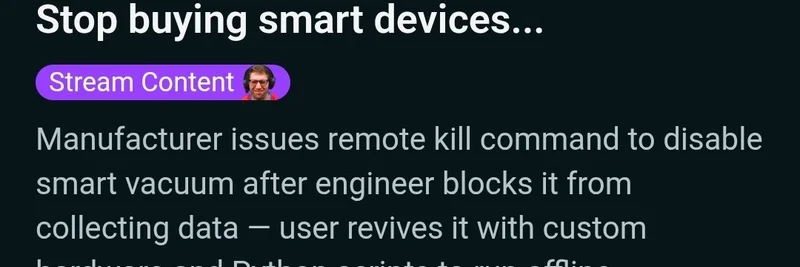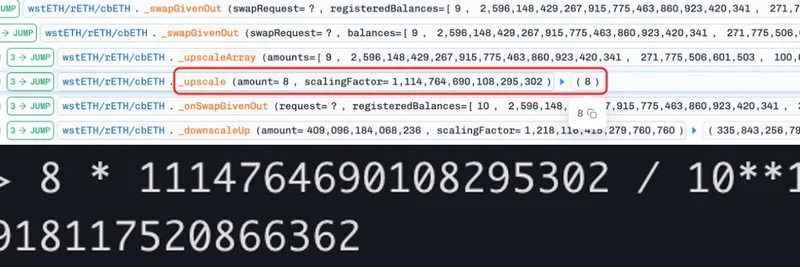Developer and streamer ThePrimeagen recently sparked a conversation on X with a post highlighting a frustrating reality of modern tech: "I hate this future. How did we get to the point of buying a device doesn't constitute ownership?" The tweet featured a screenshot of a story about an iLife A11 smart vacuum that got remotely bricked by its manufacturer after an engineer tried to protect his privacy.
The Smart Vacuum Saga: From Purchase to Brick
Let's break this down simply. Smart devices like robot vacuums promise convenience—they map your home, clean autonomously, and often connect to apps for control. But behind the scenes, many collect tons of data, from your home layout to usage patterns, sending it back to the manufacturer's servers. This telemetry data helps companies improve products, but it can feel invasive, especially if it's done without clear consent.
In this case, an engineer bought an iLife A11 vacuum (a budget-friendly robot cleaner) and decided to monitor its network traffic. He discovered it was beaming logs and data to servers without his okay. To stop this, he blocked those specific IP addresses on his router while still allowing firmware updates. At first, everything was fine. But soon, the vacuum refused to power on. Digging deeper, he found a "kill command" in the logs—a remote signal from the manufacturer that essentially turned his $300 gadget into a paperweight.
He sent it for repairs multiple times, but it would work briefly at the service center (on an open network) and fail again at home. Eventually, the warranty was deemed expired, and repairs were denied. That's when the real hacking began.
Reviving the Dead: Hardware Hacks and Python Magic
Not one to give up, the engineer disassembled the vacuum. Turns out, its software was shockingly insecure—running on an Android-based system with root access via Android Debug Bridge (ADB) that didn't even require a password. The device used Google's Cartographer tool for 3D mapping, but the onboard chip wasn't powerful enough to process it locally, so it offloaded everything to the cloud.
By reversing the kill command and rebooting, he got it working temporarily. But to make it truly independent, he built custom hardware mods and wrote Python scripts to handle operations offline. No more phoning home to the manufacturer—just local control. It's a testament to open-source tinkering, but it shouldn't take this much effort to own what you buy.
This story, detailed on Tom's Hardware, echoes broader frustrations in the tech world.
Why This Matters to Blockchain Practitioners
As someone who's navigated the crypto space, from editing at CoinDesk to now diving into meme tokens at Meme Insider, I see clear parallels here. In traditional tech, central authorities—like device manufacturers—hold all the power. They can revoke access, brick hardware, or harvest data because everything runs through their servers. It's "Hardware as a Service," as one commenter put it, not true ownership.
Enter blockchain and web3. Decentralized systems flip the script. With NFTs or tokenized assets, you verifiably own digital items—no one can "kill" them remotely. Meme tokens, like those built on Solana or Ethereum, often embody this rebellious spirit against corporate overreach. They're community-driven, with no central entity pulling the plug. Think about it: if your vacuum ran on a blockchain protocol, its mapping data could be encrypted on-chain, under your control, without mandatory telemetry.
This incident is a wake-up call for why decentralization matters. In a world where even your coffee maker might spy on you, blockchain offers tools for privacy and sovereignty. Meme tokens, with their viral, anti-establishment vibe, amplify this—turning tech gripes into cultural movements.
Community Reactions and Broader Implications
ThePrimeagen's tweet lit up discussions, with replies calling out everything from printer ink subscriptions to video game DRM. One user noted, "This isn't 'ownership'. It's 'Hardware as a Service'." Another tied it to jailbreaking devices, referencing figures like George Hotz.
Privacy-wise, the vacuum was sending 3D home maps to servers, potentially in China (given iLife's origins), raising data security red flags. For blockchain folks, this underscores the value of zero-knowledge proofs or decentralized storage solutions like IPFS, where you control your data without intermediaries.
If you're building in web3, stories like this fuel innovation. Maybe the next meme token project memes on "bricked vacuums" to promote decentralized IoT. At Meme Insider, we're tracking how these tech tales intersect with crypto—stay tuned for more.
In the end, owning your tech means more than a receipt; it means control. Blockchain is paving the way, one decentralized app at a time.



